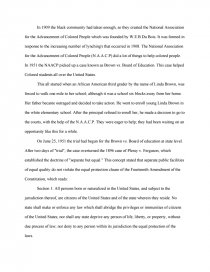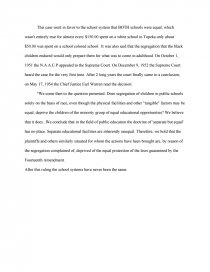National Association for the Advancement of Colored People
Essay by ashleyk1 • October 24, 2012 • Essay • 558 Words (3 Pages) • 1,212 Views
Essay Preview: National Association for the Advancement of Colored People
In 1909 the black community had taken enough, so they created the National Association for the Advancement of Colored People which was founded by W.E.B Du Bois. It was formed in response to the increasing number of lynching's that occurred in 1908. The National Association for the Advancement of Colored People (N.A.A.C.P) did a lot of things to help colored people. In 1951 the NAACP picked up a case known as Brown vs. Board of Education. This case helped Colored students all over the United States.
This all started when an African American third grader by the name of Linda Brown, was forced to walk one mile to her school; although it was a school six blocks away from her home. Her father became outraged and decided to take action. He went to enroll young Linda Brown in the white elementary school. After the principal refused to enroll her, he made a decision to go to the courts, with the help of the N.A.A.C.P. They were eager to help; they had been waiting on an opportunity like this for a while.
On June 25, 1951 the trial had begun for the Brown vs. Board of education at state level. After two days of "trial", the case overturned the 1896 case of Plessy v. Ferguson, which established the doctrine of "separate but equal." This concept stated that separate public facilities of equal quality do not violate the equal protection clause of the Fourteenth Amendment of the Constitution, which reads:
Section 1: All persons born or naturalized in the United States, and subject to the jurisdiction thereof, are citizens of the United States and of the state wherein they reside. No state shall make or enforce any law which shall abridge the privileges or immunities of citizens of the United States; nor shall any state deprive any person of life, liberty, or property, without due process of law; nor deny to any person within its jurisdiction the equal protection of the laws.
This case went in favor to the school system that BOTH schools were equal; which wasn't entirely true for almost every $150.00 spent on a white school in Topeka only about $50.00 was spent on a school colored school. It was also said that the segregation that the black children endured would only prepare them for what was to come in adulthood. On October 1, 1951 the N.A.A.C.P appealed to the Supreme Court. On December 9, 1952 the Supreme Court heard the case for the very first time. After 2 long years the court finally came to a conclusion;
...
...

